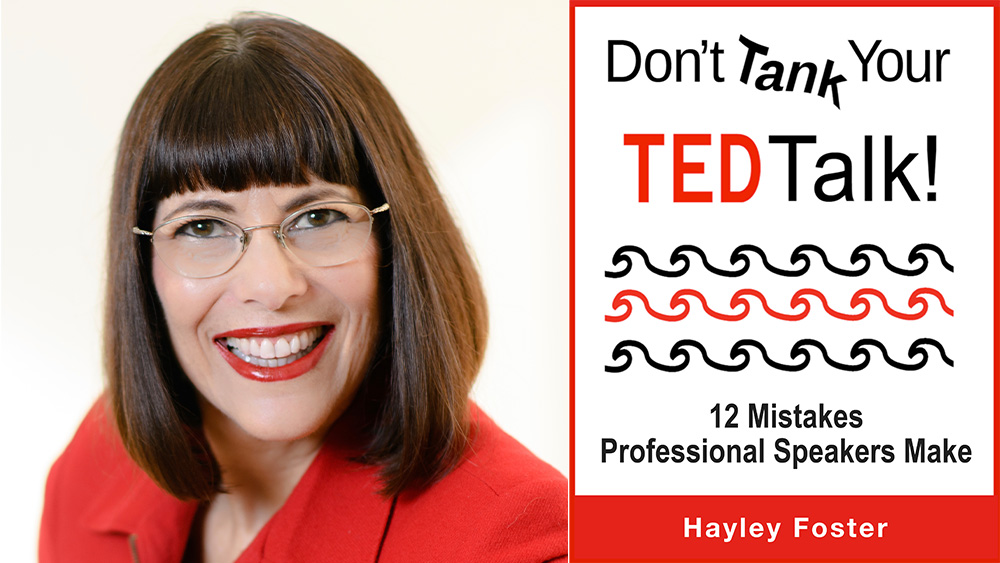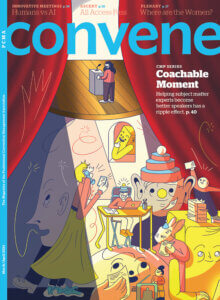
Hayley Foster is a designated TEDx speaker coach with a coaching business as the Short Talk Expert. She authored a book, Don’t Tank Your TED Talk! 12 Mistakes Professional Speakers Make.
Hayley Foster’s husband, Steve Craft, was a TEDster — someone who followed TED online “in the early days,” Foster said. At first, Foster, a professional speaker herself, didn’t share his enthusiasm for TED talks, which started becoming available online in 2007 — the speakers were primarily men and their topics not personally appealing to her, she said.
But TED eventually began featuring world-renowned experts in every field “who were giving the talk of their life in 18, 12, or six minutes,” she said. And by 2009, TED was offering independent licenses for anyone who wanted to try to organize a TEDx event.
Foster’s husband, who at that time was deputy director of strategic relationships at NASA Langley Research Center, decided that NASA should do a TEDxNASA event. NASA is synonymous with innovation and thought leadership, he reasoned, and TEDx is about ideas worth spreading. Foster said her husband thought the event could leverage the strength of both organizations.
Foster jumped in to help pull the event together, drawing in people who were non-science speakers — musicians, artists, engineers, authors, and visionaries — and figuring out a way to apply the coaching she had done as a professional speaker for beginning professional speakers and tailoring that to short talks. It was the early days of TEDx — “we were building the airplane while flying it,” Foster told Convene on a video call.

This story is part of the March/April Convene cover and CMP Series on speaker coaching. (Dalbert B. Vilarino illustration)
TEDxNASA became the first-ever large-scale TEDx event, Foster said, held in Newport News, Virginia, in 2009, and attracting 1,450 in-person attendees and 78,000 online participants from more than 10 countries.
Today, people clamor to get on a TEDx stage, but at the time, TEDx was an unknown, and speakers asked Foster, “Why would I fly across the country and donate two days of time to speak for six minutes for free?” That mindset changed as TEDx events flourished — to date, more than 13,000 TEDx events have been held in 150 countries — and speakers realized how that short time on stage reaped big dividends.
Foster became a designated TEDx speaker coach, set up a thriving coaching business as the Short Talk Expert, and authored a book, Don’t Tank Your TED Talk! 12 Mistakes Professional Speakers Make.
TED, she said, has permeated popular culture and raised the bar on what the public expects from speakers. And while short, “TED-style talks” have become a popular session format at all kinds of conferences, it’s a bit of a misnomer to call them that — not all short talks are TED-style talks, Foster said. Short talks are those given in under 20 minutes. Communicating a single new idea worth spreading in that amount of time, she said, “that’s a TED Talk.” (Find more of Foster’s speaking tips here.)
Foster has developed a core message coaching process with her clients around the TED talk approach. “If you’re going to get the message you’re meant to share distilled down to your original idea for your talk, there’s a lot of work that has to be done,” she said. The foundation of that work is internal and a coaching experience — “I reach into people and I snatch out their original idea and I help them craft and amplify it,” she told Convene. Over the course of a four-month coaching contract with a speaker, Foster may spend six weeks on that alone, before they even consider the talk’s content, visuals, delivery, and message design.
“Remember, we’re looking for your original idea. From you. Who you are,” she said. “Everything you know, everything you feel, all of your experiences — that’s the lens through which you let your audience see the information.” Foster said that you can Google the answer to anything but it doesn’t help you make sense of the results. “It is a person who offers their perspective that allows you to make sense of and integrate that information.”
Foster encourages clients to see themselves as others see them, asking them: How would you be described by a colleague, friend, someone who has just met you? Someone who’s known you your whole life? What is the difference you want to make that makes you different from everyone else? That’s because the most important element of a talk, she said, is authenticity.
Foster vets potential clients with an intensive initial phone call — audio only. “It’s better when it’s blind,” she explained, “because people tend to worry about what I think of them.” She is particular about whom she takes on as a client, only coaching people “whose ideas I agree with,” she said, and who are looking to make the world a better place.
Michelle Russell is editor in chief of Convene.

More From the Series
Earn one clock hour of CMP certification by visiting Convene’s CMP Series page to answer questions about this article, those listed below, and the Freeman Trends Report “2024 Attendee Intent and Behavior,” available for download.
- Inside WorldatWork’s Speaker Coaching Program
- 4 Ways to DIY a Speaker Coaching Program
- Attendees Want Less Flash, More Substance
- ‘Programming Stellar Content That Connects With an Audience’
- From Skeptic to Sought-After TEDx Speaker Coach
- 4 Mistakes to Avoid When Speaking at Events
The Certified Meeting Professional (CMP) is a registered trademark of the Events Industry Council.
